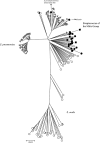Highly penicillin-resistant multidrug-resistant pneumococcus-like strains colonizing children in Oeiras, Portugal: genomic characteristics and implications for surveillance
- PMID: 19906899
- PMCID: PMC2812262
- DOI: 10.1128/JCM.01313-09
Highly penicillin-resistant multidrug-resistant pneumococcus-like strains colonizing children in Oeiras, Portugal: genomic characteristics and implications for surveillance
Abstract
While performing surveillance studies in Oeiras, Portugal, designed to describe the impact of pneumococcal conjugate vaccine on colonization, we observed an increase from 0.7% in 2003 to 5% in 2006 in the prevalence of penicillin resistance (MIC of 2 to 6 mg/liter) among presumptively identified pneumococcal isolates. Although 15 of the 22 penicillin-resistant isolates obtained in 2006 were optochin resistant, they were bile soluble and thus considered to be bona fide pneumococci. This study aimed to clarify the nature of these isolates by using a combination of phenotypic and genotypic approaches that included routine strategies for pneumococcal identification, multilocus sequence analysis (MLSA), and comparative genomic hybridization (CGH). By MLSA, all isolates were classified as "streptococci of the mitis group" that, however, were distinct from typical Streptococcus pneumoniae or Streptococcus mitis. A single isolate was identified as Streptococcus pseudopneumoniae. CGH confirmed these findings and further indicated that a considerable part of the proposed pneumococcal core genome is conserved in these isolates, including several pneumococcal virulence genes (e.g., pavA, spxB, cbpE, and cbpD). These results suggest that among pneumococci and closely related streptococci, universal unique phenotypic and genetic properties that could aid species identification are virtually impossible to define. In pneumococcal colonization studies, when atypical strains are found, MLSA and CGH are informative tools that can be used to complement routine tests. In our study, after correct identification of the penicillin-resistant true pneumococci, we found that penicillin resistance levels among pneumococci remained stable from 2003 to 2006.
Figures


Similar articles
-
Disease isolates of Streptococcus pseudopneumoniae and non-typeable S. pneumoniae presumptively identified as atypical S. pneumoniae in Spain.PLoS One. 2013;8(2):e57047. doi: 10.1371/journal.pone.0057047. Epub 2013 Feb 21. PLoS One. 2013. PMID: 23437306 Free PMC article.
-
Identification of Streptococcus pneumoniae and other Mitis streptococci: importance of molecular methods.Eur J Clin Microbiol Infect Dis. 2020 Dec;39(12):2247-2256. doi: 10.1007/s10096-020-03991-9. Epub 2020 Jul 24. Eur J Clin Microbiol Infect Dis. 2020. PMID: 32710352 Free PMC article. Review.
-
Phenotypic and genomic characterization of pneumococcus-like streptococci isolated from HIV-seropositive patients.Microbiology (Reading). 2010 Mar;156(Pt 3):838-848. doi: 10.1099/mic.0.035345-0. Epub 2009 Dec 3. Microbiology (Reading). 2010. PMID: 19959577
-
Relationships among streptococci from the mitis group, misidentified as Streptococcus pneumoniae.Eur J Clin Microbiol Infect Dis. 2020 Oct;39(10):1865-1878. doi: 10.1007/s10096-020-03916-6. Epub 2020 May 14. Eur J Clin Microbiol Infect Dis. 2020. PMID: 32409955 Free PMC article.
-
Streptococcus pneumoniae: does antimicrobial resistance matter?Semin Respir Crit Care Med. 2009 Apr;30(2):210-38. doi: 10.1055/s-0029-1202939. Epub 2009 Mar 18. Semin Respir Crit Care Med. 2009. PMID: 19296420 Review.
Cited by
-
Disease isolates of Streptococcus pseudopneumoniae and non-typeable S. pneumoniae presumptively identified as atypical S. pneumoniae in Spain.PLoS One. 2013;8(2):e57047. doi: 10.1371/journal.pone.0057047. Epub 2013 Feb 21. PLoS One. 2013. PMID: 23437306 Free PMC article.
-
Identification of Streptococcus pneumoniae and other Mitis streptococci: importance of molecular methods.Eur J Clin Microbiol Infect Dis. 2020 Dec;39(12):2247-2256. doi: 10.1007/s10096-020-03991-9. Epub 2020 Jul 24. Eur J Clin Microbiol Infect Dis. 2020. PMID: 32710352 Free PMC article. Review.
-
Superiority of trans-oral over trans-nasal sampling in detecting Streptococcus pneumoniae colonization in adults.PLoS One. 2013;8(3):e60520. doi: 10.1371/journal.pone.0060520. Epub 2013 Mar 28. PLoS One. 2013. PMID: 23555985 Free PMC article.
-
The pneumococcal bacteriocin streptococcin B is produced as part of the early competence cascade and promotes intraspecies competition.mBio. 2025 Feb 5;16(2):e0299324. doi: 10.1128/mbio.02993-24. Epub 2024 Dec 17. mBio. 2025. PMID: 39688419 Free PMC article.
-
DNA bacterial load in children and adolescents with pneumococcal pneumonia and empyema.Eur J Clin Microbiol Infect Dis. 2011 Mar;30(3):327-35. doi: 10.1007/s10096-010-1086-9. Epub 2010 Oct 24. Eur J Clin Microbiol Infect Dis. 2011. PMID: 20972810
References
-
- Arbique, J. C., C. Poyart, P. Trieu-Cuot, G. Quesne, M. D. S. Carvalho, A. G. Steigerwalt, R. E. Morey, D. Jackson, R. J. Davidson, and R. R. Facklam. 2004. Accuracy of phenotypic and genotypic testing for identification of Streptococcus pneumoniae and description of Streptococcus pseudopneumoniae sp. nov. J. Clin. Microbiol. 42:4686-4696. - PMC - PubMed
-
- Bentley, S. D., D. M. Aanensen, A. Mavroidi, D. Saunders, E. Rabbinowitsch, M. Collins, K. Donohoe, D. Harris, L. Murphy, M. A. Quail, G. Samuel, I. C. Skovsted, M. S. Kaltoft, B. Barrell, P. R. Reeves, J. Parkhill, and B. G. Spratt. 2006. Genetic analysis of the capsular biosynthetic locus from all 90 pneumococcal serotypes. PLoS Genet. 2:e31. - PMC - PubMed
-
- Bogaert, D., R. De Groot, and P. W. Hermans. 2004. Streptococcus pneumoniae colonisation: the key to pneumococcal disease. Lancet Infect. Dis. 4:144-154. - PubMed
-
- Chi, F., O. Nolte, C. Bergmann, M. Ip, and R. Hakenbeck. 2007. Crossing the barrier: evolution and spread of a major class of mosaic pbp2x in Streptococcus pneumoniae, S. mitis and S. oralis. Int. J. Med. Microbiol. 297:503-512. - PubMed
-
- Clinical and Laboratory Standards Institute. 2009. Performance standards for antimicrobial susceptibility testing; 19th informational supplement. CLSI/NCCLS M100-S19. Clinical and Laboratory Standards Institute, Wayne, PA.
Publication types
MeSH terms
Substances
Grants and funding
LinkOut - more resources
Full Text Sources
Medical
Molecular Biology Databases

